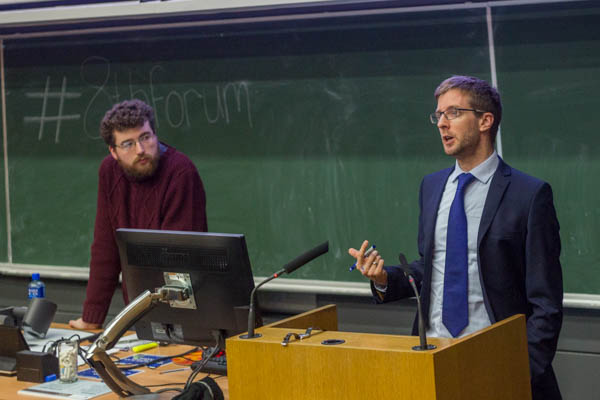There was curiosity and contention in equal measure at the Trinity College Dublin Students’ Union (TCDSU) open forum on the eighth amendment this evening. Questions of constitutional law were asked, as well as more pointed questions, with the evening rarely tipping over into outright division.
Tonight was pitched as a discussion, not a debate. Opening the event, TCDSU President Kevin Keane reminded students they weren’t in the Graduates Memorial Building’s debating chamber.
And for the most part, students respected his plea. Disagreements and clashes of opinion cropped up, but questions were largely good-humoured and there were appeals for the “moderate” viewpoint to win out.
Prof Oran Doyle, Head of School of Law and Constitutional Advisor to the Citizens’ Assembly, and Dr Marion Dyer, GP and Associate Professor in the School of Public Health, were on hand to offer neutral, balanced answers.
Doyle started the night by explaining to the crowd that should they decide to repeal the eighth amendment when a referendum rolls around, the law won’t change “at all”. The presence of the Offences Against the Person Act, which protects all life, would revert into action.
He did speculate, however, that there would be more room for the Oireachtas to legislate on the termination of pregnancies should the country decide to repeal: “My view is that if the eighth amendment were repealed, what is most likely at the start, is the Oireachtas would be able to regulate abortion as it sees fit.”
Doyle, playing a similar role to the one he played in the Citizens’ Assembly, stressed that, for the most part, his analysis was largely speculation.
Dyer, who is also a member of Doctors for Choice, expressed the belief that “abortion for Irish women is a reality”. Describing the current uncertainty in Irish law for medical practitioners, she explained that what doctors are looking for is “clarity”. “We don’t want to be consulting a legal text, we want to be focused on the health gain of the people who come to see us”, she said.
An impassioned speech from Kate Kleinle, representing the pro-life debate on the night, drew a strong, positive reaction from the crowd. Speaking for five minutes, she gave a brief outline of why, medically and holistically, she felt that Ireland should save the eighth. “The only question is if it [the foetus] is less valuable than a born human”, she stated. “I would say not.”
Reeming off facts and figures from various countries that do allow abortions, Kleinle pointed to issues legal abortion might have for women, people from poorer backgrounds and the links between abortion and disability.
Referencing the argument that a foetus doesn’t feel pain or doesn’t have “abstract thought and sense of self”, she countered that adults with learning disabilities may also not experience “abstract thought and sense of self” yet we wouldn’t consider their termination.
“Morally and legally, painlessness on death is still illegal”, she said.
Keire Murphy, a member of the TCDSU Repeal Committee, took a personal view on the issue and recounted her experience of discovering her friend had an unwanted pregnancy. Seeing her friend take this “incredibly difficult” decision to abort the foetus, Murphy said that “the eighth fails every woman who finds herself on this island”.
Referencing the right to travel, she pointed to the hypocrisy of a country that allows women to go elsewhere for an abortion but also says “not on my doorstep”. Referring to other things that are illegal in Ireland but legal elsewhere, she said that “you don’t have a constitutional right to travel to Amsterdam to get high”, much to the amusement of the crowd.
Peppered with questions on the morality of abortion, she insisted that she “never talked about the morality of the decision, I talked about the reality of the situation”. With speakers in the crowd drawing comparisons between stealing being moral in certain situations yet there is a general ban against it, Murphy responded “we criminalised all forms of stealing. We facilitate abortions”.
The town hall section of the night drew more questions surrounding the legal and medical side from a crowd who seemed as interested in educating themselves as debating the finer points of the eighth amendment.
The morality of abortion continually came up alongside ethical medical questions such as when is a foetus considered “viable”.
TCDSU were challenged on their repeal stance, with students expressing issues with the fact they didn’t vote on the mandate which the union currently holds to support a repeal campaign. Keane replied agreeing that “it is important that students’ voices were represented” but also maintained that they “did extensive polling” and the conversation remains open.
Ciaran Molloy contributed reporting to this piece.







